|
Here is an Advent giveaway from Faithfully! A printable Advent Devotional for children "Jesse Tree" - best for children age 5-9 years old. The Jesse tree devotional will help children connect the custom of decorating Christmas trees to the events leading to Jesus’ birth, a great companion for the Advent season.
Written by parishioner Pat Grappolini, a retired teacher who occasionally teaches for the Calgary Catholic School District. Her family have been parishioners of Holy Name Parish in Calgary. Read one amazing story a day, from Dec. 1 to Dec. 24 and get inspired to create your own Jesse Tree!
0 Comments
This Advent, Calgary area single mothers and babies may get a boost thanks to a generous benefactor. An anonymous donor has announced they will match all financial contributions to Elizabeth House up to $20,000 before December 24, 2020. “It’s so encouraging to get a phone call out of the blue...because we tend to be head down when times get tough,” said Michelle Haywood, Elizabeth House program coordinator. “This was a real lift in the spirit and confirmation that God will provide no matter what.” Elizabeth House is a transitional home for single at-risk pregnant and new mothers with a child up to two-years-old. They typically serve mothers under the age of 25 who are working through a history of domestic violence, trauma/mental health challenges or substance use. “We used to say we set people up for successful independent living, but we know the reality of being there out on your own as a single mom,” said Michelle Haywood. “What we hope to do is build resilience so that when stuff happens, which it inevitably will –– when hard things happen, they can get back up again. They have those inner resources and are connected in their community.” Normally Elizabeth House can take up to seven women at a time, but it’s less these days due to social distancing restrictions. For the moms currently living there, the pandemic adds an extra layer of stress. “Living in a shelter is a completely different world than facing a pandemic in your own home. The restrictions are stronger, the isolation is greater,” said Haywood. If a woman needs to isolate she would have to quarantine inside her bedroom. Her overall access to community support is diminished at a time when she is trying to build skill and connections to be able to transition out of Elizabeth House. The news of this donation matching program has brought hope to these women and a feeling of worth. “Matching the contributions are making this possible for them because we are that net that can catch both mom and babe for that time period,” said Haywood. “But it’s also about them knowing there is a community out there that cares and is willing to donate.” The Calgary couple, who asked to remain anonymous, has been donating to Elizabeth House for 20 years because they sincerely believe in the cause. After having visited the house and researching the organization, they are certain it is a reputable, well-run charity by the Catholic Diocese of Calgary. “There are a lot of charities that have big names out there. This is one that does good work, but maybe doesn’t get the same recognition as others,” said the donor. “We also realize it’s a difficult time for charities. Realizing it’s a tough time for a lot of people, we are still called as Christians to share what we have.” This matching program coincides with the diocesan I Am Blessed Campaign, encouraging the faithful to give generously through either acts of service, financial donations to parishes, schools, diocesan programs or prayer for others such as a Mass, rosary or novena. For those who cannot give financially to Elizabeth House right now, prayers are also welcomed as is looking into the process to become a volunteer. But for those who can give, Haywood said this money will sustain Elizabeth House for some time. “When we say we’re in this pandemic together, here is the action you can take. We can do a lot with a little,” said Haywood. Written by Sara Francis for Faithfully The volunteer walks the length of the snow-covered sidewalk. She turns around when the front door of the subsidized housing unit swings open. A man steps outside and waves before he bends to pick up the groceries from his front step. This is a special delivery of COBS bread and groceries. The groceries include milk and cream with best before dates two and three days hence and it’s delivered to families the day it’s donated. Some families get the extra food every week, others on the weeks when they get bi-weekly or monthly deliveries of donated bread. These families can also call for a full hamper with fresh produce, frozen meat, cheese, milk, eggs and grocery store gift cards. The Thursday drop is extra for families who welcome some extra help. They never know if the extra food box will include school snacks or fresh fruit and a bakery pie. They do know this delivery is an act of kindness. It’s the food hamper equivalent of a neighbour sharing extra food—and they are grateful. The woman at the next drop is one of three grandmothers on the Thursday List who are helping to raise grandchildren. “God bless you,” she calls out to the volunteer. “I had extra milk last week so I gave it to a neighbour,” she says. “That’s perfect,” says the volunteer. Nine short months ago, the volunteer, one of Calgary’s 900 Vincentians, would have chatted with people at each drop. These days, she and others leave groceries on front steps, ring door bells and step back. They also wear masks and use disinfectant when they can’t wash their hands—because this is what Jesus would want them to do. “There’s a pandemic, but Christ’s work continues,” adds Theo van Besouw, president of the Calgary Central Council for the Society of St. Vincent de Paul (SSVP). SSVP is an internationally-renowned lay Catholic charity with roots on the mean streets of 19th century France. The organization operates in 150 countries, including Canada. Here, much of SSVP’s work with the economically-vulnerable focuses on delivering emergency food hampers and helping people avoid homelessness by assisting with temporary crises. In Calgary, the Central Council oversees the work of 23 conferences and three particulars. Each conference works within parish boundaries. The North, South and West particulars meet with conferences in their geographic areas. “We get together to see how we’re doing and those with more resources help the others,” explains Rina McDermott. The president of a conference in northwest Calgary, she also represents that conference on the West Particular. “St. Vincent de Paul gets a lot of attention during Advent, but our work is year-round,” adds van Besouw. Across the nation and in Calgary, SSVP is the single-largest faith-based charity on the front lines of poverty. “We help everyone, regardless of faith. If you call, we answer,” says van Besouw.  People who live in the Calgary Diocese may learn about SSVP after calling a local parish to ask for help. Others get information from the website, ssvpcalgary.ca. In Calgary, 211 operators with the City of Calgary also direct people who need food to specific conferences or to the Central Council phone number. Every week, Central receives up to a dozen calls or emails from people asking for help. Those folks are matched to conferences who can bring them help. “St. Vincent de Paul is also aligned with other charities who can bring people food. We’re building relationship with other groups all of the time,” says van Besouw. Conferences with lots of Vincentians (SSVP volunteers) continue to provide food hampers during the pandemic. Others have suspended their hamper programs due to concerns about their volunteers. “But we are certainly not closed,” insists van Besouw. “Some of the conferences now give people grocery store cards instead of food. The pandemic has helped us be more creative. We’re learning to do contact-free deliveries of food and grocery store cards and we’re keeping in touch with people by phone. We want to keep the people we serve and Vincentians safe, but we also want to feed people.” On-boarding new Vincentians is bit complicated, because the pandemic makes it difficult to conduct security checks. “But if you want to get involved with SSVP, or to start a conference at your parish, please reach out. We welcome new ideas at the table,” says van Besouw.
Written by Joy Gregory
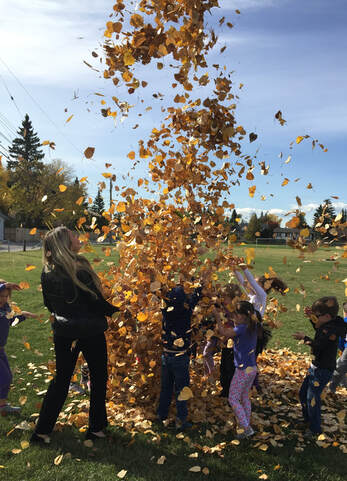 Christmas time is such a beautiful time. I think of Mary often and wonder about the night she gave birth to Jesus. Did she look at him with awe? Did she stare at his button nose? Did she tickle his little toes? Did she put one finger in his little hand as his fingers wrapped around hers? Did she rub his hair and hold him tight? Did she cry? Did she say out loud, “This is my boy!”? I am so blessed to be a mom of four beautiful kids. With each one I remember just staring at them through the night in awe of God and his blessings. Thinking that Mary was a mother just like me puts the very first Christmas in such a different light. Do we consider the anticipation that Mary and Joseph felt while waiting for the birth of Jesus? And the joy they experienced when he was born! As a parent, I know that this waiting time was very special. A book that I read to my Kindergarten students is Little One, We Knew You’d Come, by Sally-Lloyd Jones. I invite the children to bring a baby picture to class and encourage parents to have a conversation with their child about the anticipation they felt as they waited for their child to arrive. Do we take the time and look at the children we teach as the blessing that they are? My sister (a doctor) just told me about a funeral she attended recently, for an eight-year-old girl. Fifteen hundred people were there. She loved school so much that she came hooked up to an oxygen tank to help her breathe. The principal moved his desk outside the teacher’s door in case the little girl needed help. Her parents spent the days at the school reading books and newspapers while their daughter was in class. Any moment could be her last. Everyone waited. Just like her parents had waited for nine months for her to be born – although this waiting was going to end with a goodbye. She went to school Friday, blueish because her lungs were failing. Her dying wish was to go to school. She would never miss the Remembrance Day Assembly. She LOVED school. She died two days later. Staff and families did not know that Friday would be their last day with this eight-year-old girl. The principal was asked to give the eulogy at the funeral. Everyone in the school was there. She loved stuffies, and her parents brought every stuffy she owned. When the children came in the church, they were offered a stuffy to cuddle. One last act of love… to love the things she loved most! This Christmas, let us be mindful of the impact and privilege we have to be a teacher or work in a school. We play such an important role in bringing joy to the families of the students we teach. Families send their precious little ones (or big ones) to us daily to love, teach, support, help and nurture. Each child is a gift. God’s gift. Our mission is to look into the eyes of every child we teach and see the face of God. It is a blessing to be a teacher, a coach, a support worker, an administrator and custodial staff. We all have an opportunity to celebrate the life of a child.
Novelist Jeanine Cummins uses these lines from Chilean poet Pablo Neruda´s poem “The Song of Despair” as an epigraph in her novel “American Dirt.” The novel tells the story of a mother and son from the State of Guerrero in Mexico who wage an unbelievable struggle for life and freedom from the violence that engulfs this state and others in Mexico. Just the other day I received a phone call from Paloma, a young mother from Guerrero who is in hiding with her husband Santiago and three small children. I have known Paloma since she was born. She has no formal education, but she is an incredible young woman and a great mother. Santiago’s two brothers were recently murdered by members of a crime cartel; Santiago managed to escape, but everyone in the village knows that his name is on the hit list. I helped the family contact a human rights organization that is trying to get them asylum in another country. However, due to the COVID pandemic, all of that paperwork is presently on hold, and the family remains in hiding. Impoverishment, violence, corruption, discrimination, impunity, injustice … these are the daily fare of too many indigenous people living in the mountains of the State of Guerrero. The reason that the above-mentioned lines from Pablo Neruda come to my mind is that Mission Mexico has for twenty years been a “fruit” for many in the midst of the “thirst and hunger” of this reality; it has been “the miracle” for many in the midst of the “grief and ruins” of this reality. Since the year 2000, Mission Mexico has been accompanying the people of “the Mountain” of Guerrero. Approximately 500,000 people from three indigenous cultures (Na´savi, Me’phaa, Nahua) live spread out among 700 towns and villages. Mission Mexico has partnered with several trustworthy Mexican organizations to promote projects related especially to health, education, and self-sufficiency. Transformation of such a difficult reality has never been easy, but Mission Mexico has earned the gratitude of thousands of families living in this poorest region of the country of Mexico. Now there is COVID. Everything has changed. People have gotten ill and died. It is hard to give numbers because most of the people seldom go to a hospital; medical care always involves expenses. People have lost jobs, due to the closure of all kinds of businesses. Financial assistance from illegal workers in the United States who typically send money to their families each month has diminished. Education has been particularly hard hit. At the present time, there is no face-to-face, classroom education in the Mountain of Guerrero. Everything is meant to be online learning, using either television or the Internet. This presents an almost impossible situation for thousands of families in remote villages in the mountains. I used the expression that “everything is meant to be online learning” on purpose, because many teachers, realizing that their students have little or no access to computers or television, are going to the villages with photocopied worksheets: they leave “homework” with the students and return two weeks later to pick up the completed worksheets and to leave more. It’s not an ideal situation for many reasons: teachers risk contagion during their travels; many parents are illiterate and can’t assist their children; if a student falls behind, there is no remedial assistance. But I admire the teachers for trying to do what they consider is best for their students. Mission Mexico began helping sixteen years ago to build the Champagnat High School of the Mountain, a residential school for impoverished indigenous youth; it is run by a Mexican religious order, the Marist Brothers. And Mission Mexico has a bursary program for university students from particularly needy families. The hundreds of students from the high school and university are involved now in online learning, which often means that students have to move to a town where there is Internet service. The support for the high school and for the bursary program is vital to the success of the students in this endeavor. However, it is almost impossible for Mission Mexico to meet the “usual” goals in terms of financial support. COVID has hit the Diocese of Calgary too. The level of donations to Mission Mexico has diminished. This is understandable, and I assure the people of the Diocese of Calgary that their “friends” in the Mountain of Mexico are praying for them. I also hope and pray that as the “thirst and hunger” and “grief and ruins” of the indigenous peoples here hit almost desperate levels, God might touch the hearts of people in the Diocese of Calgary to extend their generosity, so that Mission Mexico might continue accompanying these very needy people is this time of very real need. Every looney or tooney helps. Please consider going to the donation page on the website missionmexico.com or giving during the special collection that the Diocese of Calgary is promoting in parishes on December 12 & 13, the weekend of the feast day of Our Lady of Guadalupe. Your solidarity will change lives here.
Having the obligation to attend professional development training with some regularity, and presenters seeking to have their audiences more engaged, I am often witness to grown adults frantically looking around as soon as they hear we’re going to break into groups. The desire to belong, and even more the fear of being alone, is strong within us. Though attributed alternately to the writers of “Charlotte’s Web” and “Stuart Little” or “The Adventures of Tom Sawyer” and “Huckleberry Finn,” the quote runs that trying to explain a joke is like dissecting a frog – you gain understanding while losing your subject. This can be said also of discussing friendship. Much of its charm lies in what is unspoken. Aristotle said there are friendships of utility and convenience – we get something that makes our way easier; there are also friends who bring us pleasure – being with them is enjoyable. But the philosopher really points to those who spur us on to being better. In the language of our faith, these relationships help us mutually perfect one another; they foster virtue. And no doubt they are also useful and pleasurable. Finding such people and making and keeping such relationships can involve lots of trial and error. Friendships usually start with those near us, whom we encounter more than by accident. Over time we feel an attraction to this other personality and discover what we have in common. It is upon this that something of substance can be built. We give and take in an easy-going and natural process. When there are difficulties, we invest to make a fix, and we continue to grow. For most of us, the challenges of our current day are different in kind though perhaps not in degree from what has come before, or will come hereafter. Now as always we can find opportunities to be friends more fully and deeply, to those who are already in our social circles and those who are not yet. Recently required compliance with the imposed COVID-19 restrictions has disrupted many aspects of regular life, including our contact with others. The normal ways that we have informally cared for one another are no longer the same. While we can lament that loss, we can also be grateful for the chance to extend both how and to whom we show care. In justice, those who have first claim upon our energies are family and friends, and those in greatest need. Every liturgical season offers renewed opportunity to become more like Jesus. Advent in particular calls us to make straight and prepare, to ease what is difficult for others. These are expressions of friendship. And we can make them even for those with whom we have no visible connection, as expression of charity, as acts of service to others in the Body of Christ. If it is Jesus’ will to be Friend to all, and we are friends to him, the deepest of connections exists already.
“It’s like getting a hug from God!” That’s how Sharon Hagel describes the experience of receiving a hand-knitted ‘prayer shawl’. These beautiful wraps aren’t simply warm they are also imbued with prayers for the comfort and assistance of whoever ends up wrapped in their folds. So whether the recipient is a grieving widow or a sick child, they get a card explaining how they were prayed for and how God is an ever-present help in times of trouble. Hagel and a dedicated group of knitters have been meeting at the Martha Retreat Centre in Lethbridge for longer than Hagel can remember. For two hours, over six to ten weeks, they knit, pray and converse. Even when Covid restrictions limited the size of the group, they welcomed new members to this ecumenical endeavour. Hagel says, “We’re all there for the same purpose, to support the needy.” During the group’s biannual sessions many prayer shawls are completed because participants often work on knitting at home too. For Hagel it has become a regular part of her prayer life. “I sit with the Lord and I knit,” she says. “I say, OK Lord, whoever this is for, be with this person.” Many hundreds of wraps later, Hagel and the informal group of knitters continue to offer a tangible sign of God’s love to those in need of a loving embrace. A key pillar of the diocesan I Am Blessed campaign is to act decisively in aid of the needy. While most Catholics do this sporadically, a few go above and beyond. Recently, I spoke with two such women in Lethbridge who have quietly spent decades helping others by sharing their talent for knitting and crocheting. As I spoke with Sharon and Jenny, I was moved to consider how I might use my own modest talents in a pro-active way, not simply to amuse myself and my friends, but to further the coming of God’s kingdom on earth. I hope these stories might inspire others too. For over 15 years, Jenny Feher has been crocheting afghans for residents of long-term care homes. “It began when Fr. Ed Flanagan mentioned there was a need in the hospital,” Feher says. “I stopped for a while but then, after my husband died, Fr. Wilbert Chin Jon suggested I might start again. The need was still there.” Feher, a lively member of All Saints Parish in Lethbridge, prefers to work on her craft while watching TV. “If I wasn’t doing this I’d go bonkers,” she says with a laugh, “I don’t sit there feeling sorry for myself, I’m too busy counting!” Feher’s practical ministry has produced scores of colourful lap blankets over the years. Most are distributed over the Christmas season with a message of love and hope for the recipients. Visitors to local care homes can testify to how many of these striped treasures endure, and are seen tucked into wheelchairs or across bed covers. Grateful family members sometimes send thanks to the parish, never knowing who made the gift which warms their loved one. Feher is matter-of-fact about her outreach. “Everybody’s got their talents,” she says humbly while crocheting on.
|
Author
Catholic Pastoral Centre Staff and Guest Writers Archives
July 2024
Categories
All
|




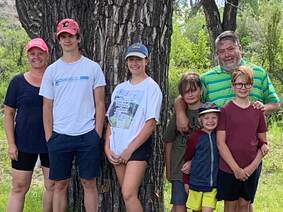

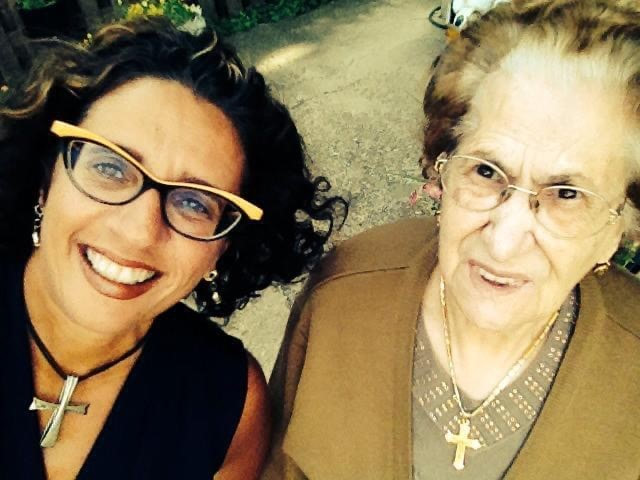
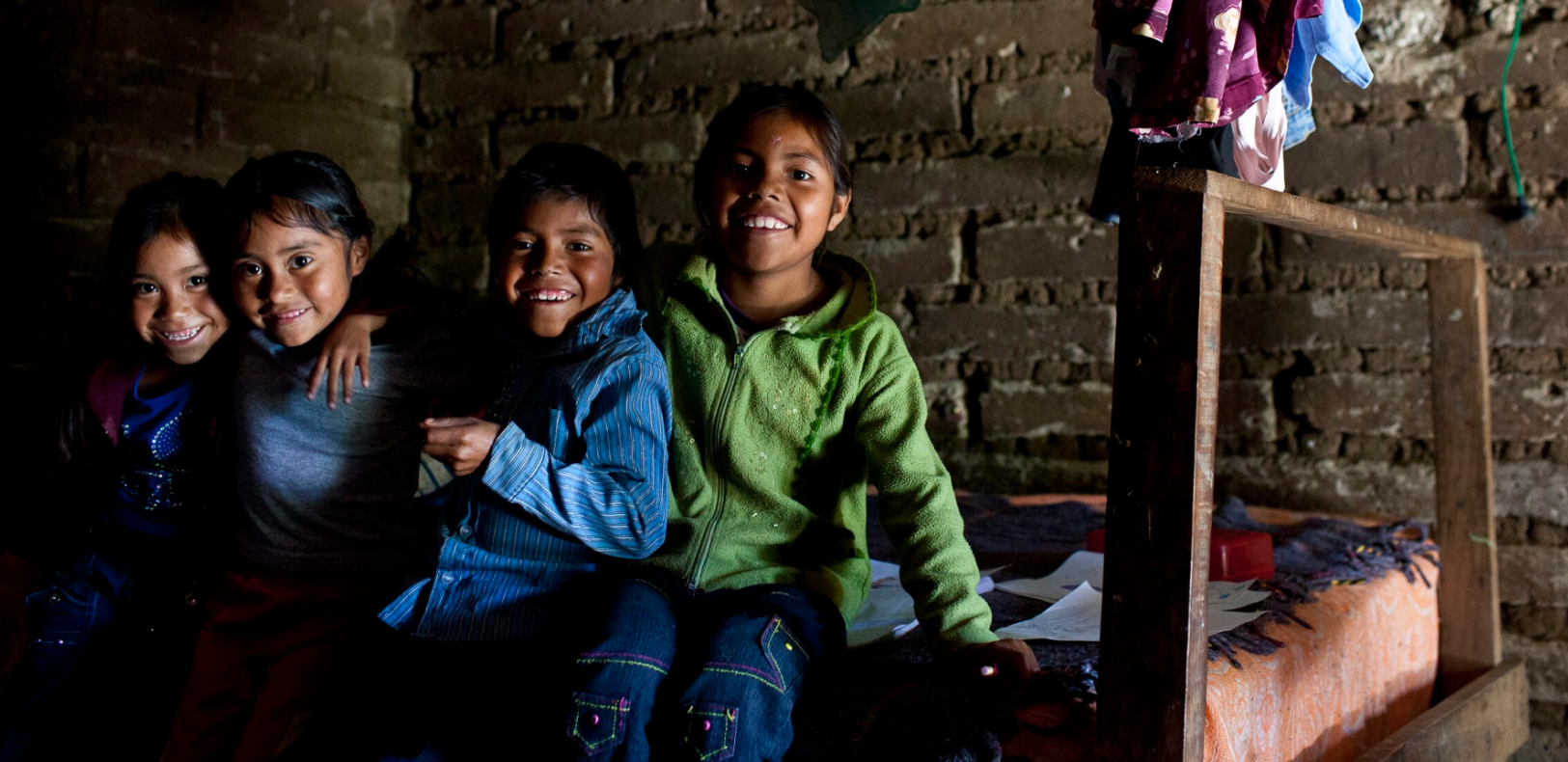






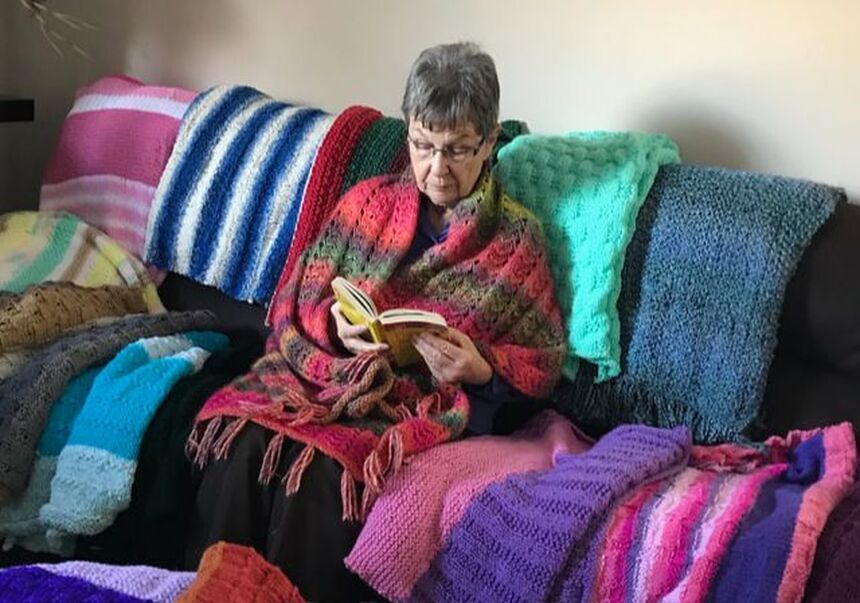
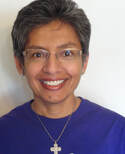
 RSS Feed
RSS Feed